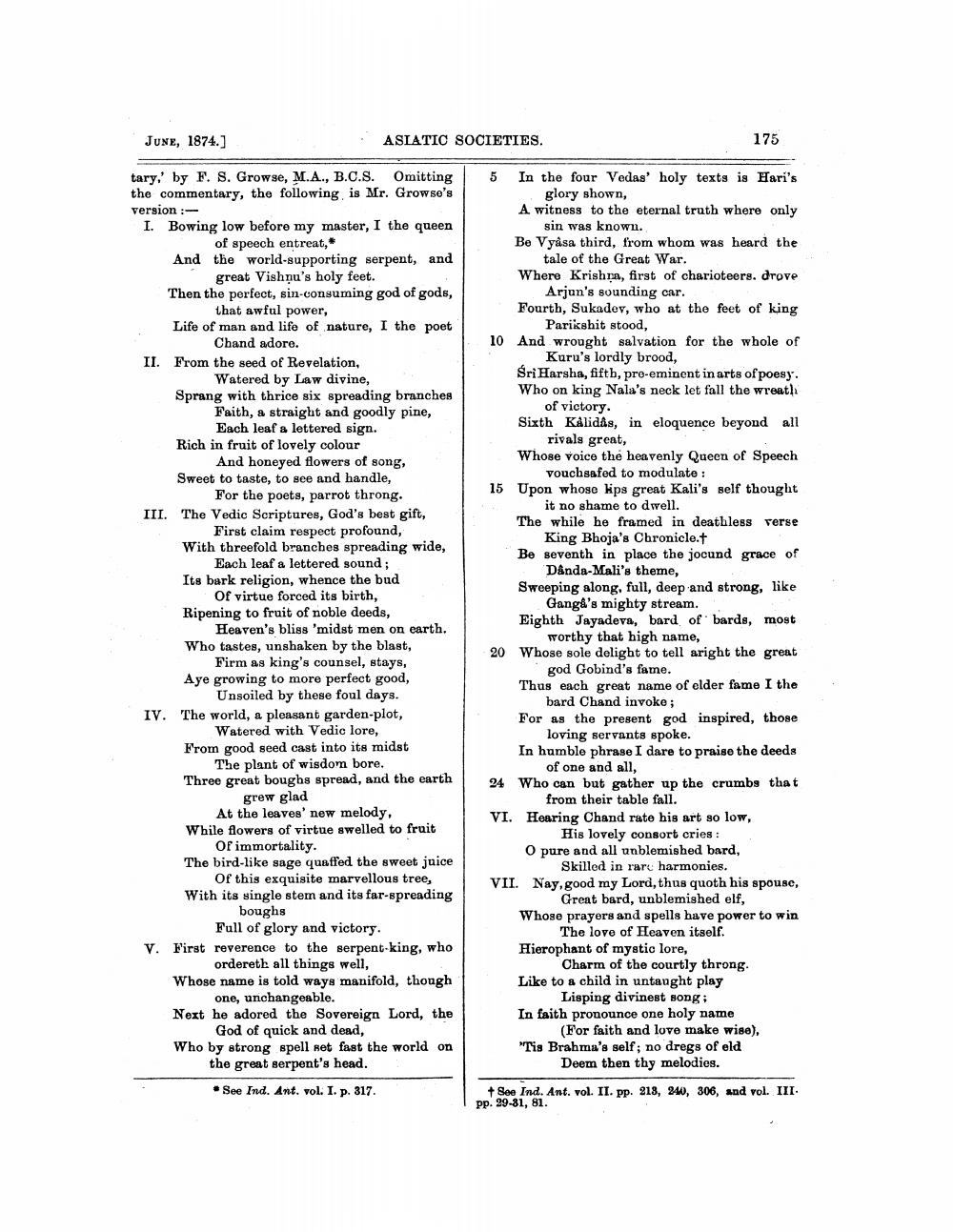________________
JUNE, 1874.]
• ASIATIC SOCIETIES.
175
tary.' by F. S. Growse, M.A., B.C.S. Omitting the commentary, the following is Mr. Grow so's version :I. Bowing low before my master, I the queen
of speech entreat,* And the world-supporting serpent, and
great Vishnu's holy feet. Then the perfect, sin-consuming god of gods,
that awful power, Life of man and life of nature, I the poet
Chand adore. From the seed of Revelation,
Watered by Law divine, Sprang with thrice six spreading branches
Faith, a straight and goodly pine,
Each leaf a lettered sign. Rich in fruit of lovely colour
And honeyed flowers of song, Sweet to taste, to see and handle,
For the poets, parrot throng. III. The Vedic Scriptures, God's best gift,
First claim respect profound, With threefold branches spreading wide,
Each leaf a lettered sound; Its bark religion, whence the bud
Of virtue forced its birth, Ripening to fruit of noble deeds,
Heaven's bliss 'midst men on earth. Who tastes, unshaken by the blast,
Firm as king's counsel, stays, Aye growing to more perfect good,
Unsoiled by these foul days. IV. The world, a pleasant garden-plot,
Watered with Vedic lore, From good seed cast into its midst
The plant of wisdom bore. Three great boughs spread, and the earth
grew glad At the leaves' new melody, While flowers of virtue swelled to fruit
Of immortality. The bird-like sage quaffed the sweet juice
Of this exquisite marvellous tree, With its single stem and its far-spreading
boughs
Full of glory and victory. V. First reverence to the serpent-king, who
ordereth all things well, Whose name is told ways manifold, though
one, unchangeable. Next he adored the Sovereign Lord, the
God of quick and dead, Who by strong spell set fast the world on
the great serpent's head. * See Ind. Ant. vol. I. p. 317.
5 In the four Vedas' holy texts is Hari's
glory shown, A witness to the eternal truth where only
sin was known. Be Vyasa third, from whom was heard the
tale of the Great War. Where Krishra, first of charioteers, drove
Arjun's sounding car. Fourth, Sukadev, who at the feet of king
Parikshit stood, 10 And wrought salvation for the whole of
Kuru's lordly brood, Sri Harsha, fifth, pre-eminent in arts of poesy. Who on king Nala's neck let fall the wreath
of victory. Sixth Kálidas, in eloquence beyond all
rivals great, Whose voice the heavenly Queen of Speech
vouchsafed to modulate : 15 Upon whose kips great Kali's self thought
it no shame to dwell. The while he framed in deathless verse
King Bhoja's Chronicle.t Be seventh in place the jocund grace of
Dånda-Mali's theme, Sweeping along, full, deep and strong, like
Ganga's mighty stream. Eighth Jayadeva, bard of bards, most
worthy that high name, 20 Whose sole delight to tell aright the great
god Gobind's fame. Thus each great name of elder fame I the
bard Chand invoke; For as the present god inspired, those
loving servants spoke. In humble phrase I dare to praise the deeds
of one and all, 24 Who can but gather up the crumbs that
from their table fall. VI. Hearing Chand rate his art so low,
His lovely consort cries : O pure and all unblemished bard,
Skilled in rare harmonies. VII. Nay,good my Lord, thus quoth his spouse,
Great bard, unblemished elf, Whose prayers and spells have power to win
The love of Heaven itself. Hierophant of mystic lore,
Charm of the courtly throng Like to a child in untaught play
Lisping divinest song i In faith pronounce one holy name
(For faith and love make wise), "Tis Brahma's self; no dregs of eld
Deem then thy melodies. + See Ind. Ant. vol. II. pp. 213, 210, 306, and vol. III. pp. 29-31, 81.
ell




